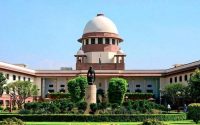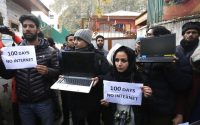Supreme Court refuses to stay Citizenship (Amendment) Act.
Source – thehindu.com
The Supreme Court on Wednesday refused to stay the implementation of the Citizenship Amendment Act (CAA), 2019, which fast-tracks citizenship by naturalisation process for “illegal” migrants from six religious communities, other than Muslims, who have fled persecution from Pakistan, Bangladesh and Afghanistan.
Chief Justice of India (CJI) Sharad A. Bobde instead orally suggested to the government to publicise the actual intent of the Act so that there was no confusion among the public about its objectives and aims.
Violence, riots, arson, police action on protesting students have spread to various parts of the country since the notification of the Act on December 12.
“There is need to publicise why the Act [CAA] is passed. There is a need for that,” Justice Bobde addressed Attorney General K.K. Venugopal for the Centre.
“I agree. We will see to it,” Mr. Venugopal responded.
‘Lot of confusion’
The CJI’s comments came on a submission by advocate A.K. Upadhyay that there was a lot of confusion in the public mind about the objectives of the CAA.
The government has maintained that the amendments made to the Citizenship Act of 1955 were meant to protect and welcome religiously persecuted people fleeing the three neighbouring countries where Muslims form the majority.
The Supreme Court issued a formal notice admitting 59 petitions filed by people from all walks of life and faiths to parliamentarians to retired High Commissioners and service officers to lawyers, students, activists, professional associations to Opposition political parties cutting across regions and ideology and NGOs.
The court said it would hear the petitions on January 22. This is its last working day before it closes for winter vacations till January 1.
Lawyers’ plea
But lawyers continued to fervently urge the Bench, also comprising Justices B.R. Gavai and Surya Kant, to stay the Act even after the court called the next case.
“We are not going to hear this case today!” Justice Bobde said emphatically.
Mr. Venugopal said there were at least four judgments of the court, which said an Act once notified as law cannot be stayed.
“The Act has not come into existence. Its Rules are yet to be notified,” senior advocate Rajeev Dhavan, for a petitioner, countered.
During a brief but tense hearing, both the CJI objected to how several lawyers shouting at the same time to be heard by the Bench created an atmosphere of ruckus not befitting the court’s decorum.
“I went to the Pakistan Supreme Court. They have a lectern where only one lawyer addresses the Bench… We should have something like that here,” Mr. Venugopal said.
Petitioners’ arguments
The petitions argue that the law welcomes “illegal migrants” into India selectively on the basis of their religion and pointedly exclude Muslims. It has an “unholy nexus” with the National Register of Citizens (NRC) exercise and is against the principles of secularism, right to equality and dignity of life enshrined in the Basic Structure of the Constitution.
The new law fast-tracks citizenship by naturalisation for minority Hindu, Sikh, Buddhist, Jain, Parsi or Christian migrants from Pakistan, Afghanistan and Bangladesh who enter India illegally, claiming religious persecution in their native countries, the petitions point out. They say the Act selectively agrees to grant citizenship benefits to illegal migrants from only three countries. Why not those from Sri Lanka, Bhutan and Myanmar, they ask. Besides, the new law does not impose any requirement on illegal migrants from the six religions to prove their claim of religious persecution or even a reasonable fear of it.
The petitions say the legislation effectuates discrimination on the basis of the intrinsic and core identity of an individual, that is, his religious identity as a Muslim. The Act ensures that only an illegal immigrant who is Muslim will be singled out and prosecuted under the Passports (Entry into India) Act, 1920 or the Foreigners Order 1949 and deprived of his personal liberty. On the other hand, illegal migrants from the protected six religions will be entitled with Indian citizenship and the benefits that come with it. While Muslim migrants should show their proof of residency in India for at least 11 years, the law allows illegal migrants from the six communities to be naturalised in five years time.



